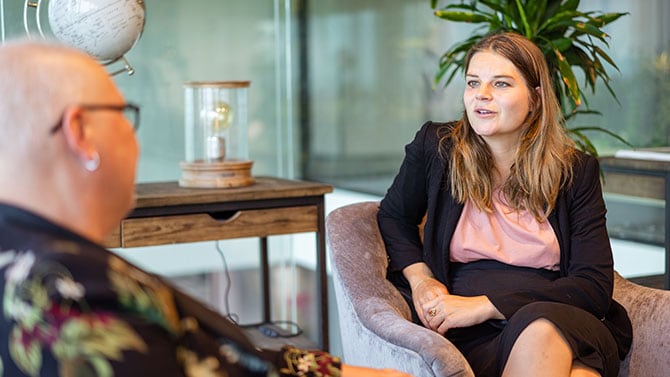
Employers and employees seek new forms of co-determination
01/06/22
Young talent and employers in conversation about the labor market
Attracting and retaining talent is one of the biggest challenges for employers in 2022. What are young people looking for in their work? And how can employers respond to this effectively? In the run-up to the Workforce Preference Study (WFPS) event 2022, PwC is bringing together various representatives of young talent and employers for an interview.
In the first conversation, Marie-Christine de Loë and Raymond Welmers discussed the challenges between young people and organizations in the labor market. In the second conversation Juno Wilbrink and Marc Borggreven joined. They discussed the results of the WFPS and how they relate to Marc's managerial experience over the past four years. In this third and final interview of this series, Janet Visbeen (member of PwC NL Tax and Legal board) and Justine Feitsma (chairman of CNV Youth) join the discussion. Together they talk about the relationship between employer and employee, the importance of a good basic salary and the wellbeing of young talent.

Janet Visbeen (Member Tax and Legal Board PwC Nederland) and Justine Feitsma (Chair CNV Jongeren)
A 'relationship' with your employer
Marc Borggreven and Juno Wilbrink concluded the previous interview with a question for Justine Feitsma and Janet Visbeen: how do you ensure – despite the different interests – that you as employer and employee continue working together in the organization?
Visbeen: 'I see it a bit like a relationship you enter into. There must be something in it for yourself, but you also want to work it out with the other party. Looking at the landscape of trade unions and works councils is always constructive. At least at PwC. Usually you are not opposing each other, but both parties want clarity. It is often portrayed as polarizing. Of course it can be abrasive, but one party cannot do without the other.'
As chairman of CNV Youth, Feitsma regularly hears that organizations and employees are having discussions about agreements that are not set in stone, such as the work-life balance. ‘There has to be understanding for each other's circumstances, but it can indeed be abrasive. For example, we regularly hear from young people that there are problems with bereavement leave. Bereavement leave is very important. The need differs per individual. The goal is to continue work in a healthy way, but at one point we heard from young people ,who lost someone recently, saying that they were received messages by their employer, asking when they would come back to work. That was no exception, it happened quite often.’
Visbeen finds this highly inappropriate, but also understands that an organization must at some point know where it stands. ‘I see that people take a lot of private things with them to work. Other stressors often play a role in the background of burnout symptoms, such as a first child or a death. As an employer, it is sometimes difficult to decide what you can and cannot ask for in a private matter. If someone hasn't returned after three weeks, where do you draw the line? That is a balance that organizations have to find with their employees.’
Many young people experience pressure
After two years in which working from home was the norm, we now have to find a balance again in the degree of flexibility within working hours. One of the trends identified in the Workforce Preference Study 2022 is the increasing importance of flexibility for young people. ‘You can be flexible, but then you are always on’, Feitsma immediately adds a comment. ‘You are constantly available through your telephone and internet. You feel the pressure to perform and want to do well. It's less 9 to 5 than it used to be and you might be picking things up late at night. This is partly due to too much pressure to perform among the new generation.'
Visbeen does not fully agree with this: 'I think there is less overtime culture, because we work from home more.'
Feitsma: 'But is that only because people are not physically present? I can also imagine that if you are at home, you are still busy with work.'
Visbeen: 'I suspect that many young people experience pressure without actually working. Young parents may like to manage their time flexibly. But a number of contemporaries feel a constant pressure, at home and in the office. As an employer, you therefore have to provide tailor-made solutions to see what suits each individual best.'
Feitsma recognizes herself in this. 'CNV Youth, for example, advocates the right to inaccessibility, but as a trade union we are also looking for other solutions, for example the thirty-hour working week or making a burnout prevention plan mandatory that offers customization.'
The future of young people within the union
Young people therefore seem to have a greater need for flexibility and customization. But what does this mean for the role of trade unions? In the first interview, Raymond Welmers was critical of the representation of young people within trade unions. Feitsma acknowledges that problem. 'As a trade union, we also stand up for the interests of young employees. We are always looking for new forms to appeal to this group even more. The collective sense of the union may feel at odds with the trend of individualism among young generations. We try to respond to this by offering more individual services, such as career coaching. Moreover, I believe in the power of the union, because together you will always be stronger.'
Feitsma: ‘Wherever that is important, is within organizations themselves. There we see that young people are poorly represented in works councils; they are aging enormously! While that is the place where you have a say and can influence your working environment. We do see that young people want to express themselves in different ways. It is then a matter of looking for a new way of involving young people in a works council.'

Visbeen: 'In my view, young people find it annoying to identify with one 'group'. The need to move inside and outside the organization in these kinds of networks is diminishing. As an employer, I think it is important that young people make their voices heard in order to get a supported image.'
Feitsma: 'Older people on the works council often say that they are young at heart. But it does not work like that. We must also make the voice of young people heard! I think that a works council should be more visible to young people in some areas. That could be better.’























